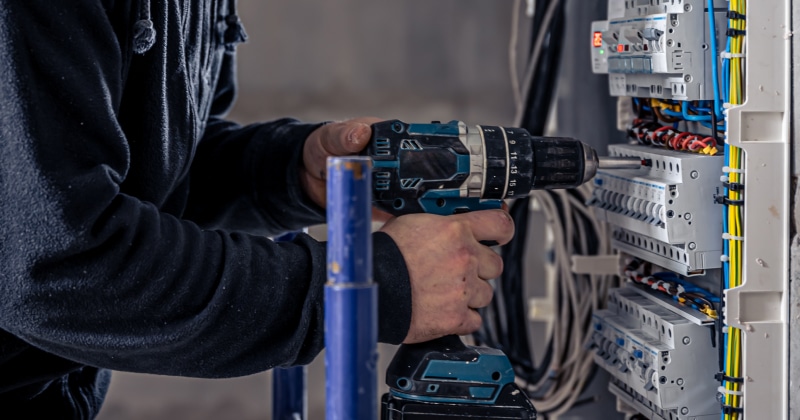What Is Industrial Electrical Work?
Industrial electrical work includes installing, maintaining, and repairing electrical systems in industrial settings. These systems are found in factories, plants, and manufacturing facilities.

Guest Contributor
Industrial electrical work is a critical field. All kinds of industrial production would grind to a halt without industrial electricians. It’s not overstating things to say their work is essential.
The pay is good. The work is interesting. And there’s job security. But it can be challenging and dangerous, too.
In this article, we’ll take a closer look at what industrial electrical work involves. We’ll cover some common industrial electrical tasks. And we’ll explain how industrial electricians are different from general electricians.
Let’s get to it.
What is Industrial Electrical Work?
Industrial electrical work includes installing, maintaining, and repairing electrical systems in industrial settings. These systems are found in factories, plants, and manufacturing facilities.
An industrial electrician’s day can easily involve critical repair work. For example, maintaining functionality to prevent an entire mill operation from shutting down.
Other types of industrial electrical work include:
- Installing or repairing electrical wiring and systems
- Troubleshooting electrical problems
- Maintaining and repairing motors, generators, and other electrical equipment
- Inspecting electrical systems to ensure they are up to code
- Installing or repairing lighting systems
The Growing Demand for Industrial Electricians
The construction industry is booming, and so is the demand for industrial electricians.
The need to replace aging electrical infrastructure is very real. Some industrial facilities date all the way back to the early 20th century.
Current trends suggest electrician jobs will grow 7% by 2031. Much of this is due to the ongoing growth of the power generation field. We need industrial electricians to upgrade electrical systems to solar and wind-powered systems.
Additionally, the need for cybersecurity continues to grow. Hackers learn new, more sophisticated ways to exploit companies every day. Electrical systems can provide a way into a company’s network. So, industrial electricians need to keep cybersecurity in mind.
Any cyberattack is cause for concern. The fallout can be catastrophic. But when the target is a utility provider, government facility, or hospital? Then it’s a true disaster.
Companies need industrial electricians trained in cybersecurity. It’s an important aspect of stopping these attacks.

What Do Industrial Electricians Do?
Regardless of industry, there are some common tasks that most industrial electricians tackle. Let’s take a look.
Install New Electrical Systems
Industrial electricians install new electrical systems to replace aging infrastructure or damaged components. This includes running conduit, pulling wire, and making connections. They use many of the same electrician tools as residential and commercial electricians do.
They also run tests to ensure the systems are functional and at full performance. This can help spot any problems before they cause a larger issue.
What makes these systems different? The power behind them. Industrial settings use three-phase power. Homes typically use a single-phase power supply. Three-phase power supplies operate at a higher voltage.
Industrial electricians work on these kinds of systems we use every day.
Maintain & Repair Existing Electrical Systems
Maintaining electrical systems can improve performance and lower costs. (Downtime is expensive.)
After all, why replace a system if it’s repairable? Industrial electricians are the folks who keep these systems running.
Industrial electricians inspect systems for damage, as well as wear and tear. They also test systems to ensure everything’s in working order. When they find an issue, they repair or replace the damaged part.
That may not sound like glamorous work, but it’s critical.
For example, consider the oil and gas industry. Drilling and extraction systems rely on electricity. Industrial electricians maintain these systems.
If they didn’t, whole systems might need replacement. If that became the norm, you’d definitely see higher gas prices! (And who wants that?!)
How Much Do Industrial Electricians Make?
The specific work an industrial electrician does will vary by industry. Industrial electrician salaries also vary by state. And there are plenty of industries that rely on industrial electricians.
Some of these vital industries include :
- Computer and electronics manufacturing
- Scientific and technical services
- Transportation
- Manufacturing
Each of these fields comes with unique challenges, as well as adjusted compensation.
For example, industrial electricians working in computer and electronics manufacturing make the most. Their annual pay comes in just shy of $100,000 per year. Those who focus on machinery manufacturing make about $20,000 less per year.
Industrial Electrician Vs. General Electrician
An electrician is an electrician—right? Not exactly.
Industrial electrical wiring work is quite different from general electrician work. The equipment used, load demands, and energy needs aren’t the same at all.
Here are some key differences.

Working Conditions
Industrial electricians specialize in industrial and commercial settings. These settings are often dangerous because of the high-voltage systems involved. And the machines they work on are dangerous, themselves.
Large manufacturing machines can cause serious harm if you’re not careful.
In contrast, general electricians work primarily in residential and office settings. Like industrial electricians, they install, maintain and repair electrical systems.
But their working conditions aren’t as hazardous.
Training
An apprenticeship is a requirement for any electrician, regardless of field.
Industrial electricians need to complete an apprenticeship. They may also need a journeyman’s license. This requirement varies by location.
In some states, industrial electricians also need to meet a training hours requirement. That’s training hours within an industrial setting.
General electricians may not need as much formal training, depending on location.
Compensation
Most of the time, industrial electricians earn more than general electricians. There are exceptions, of course. But in most industries, industrial electricians make more.
For example, the average salary of a general electrician is $60,040 per year.
Industrial electricians in the coal mining industry make an average of $75,500 per year. Those working in air transportation average $92,550. And industrial electricians working in natural gas distribution make six figures.
Recognizing the Importance of Industrial Electrical Work
Industrial electricians play a vital role in our economy and society. Remember that the next time you flip a machine switch, take a ride on the subway, or use a power system.
An industrial electrician who made that possible. Without them, our world would be a lot less bright.
Stephanie’s background is in content strategy and marketing, with a passion for connecting the dots. When she’s not hard at work, you can find her leading her daughter’s Girl Scout Troop and school PTA.

Business Solutions For Field Service Pros
EverPro offers specialized solutions designed for home and field service professionals. We’ve got the business tools to help you get the job done.



